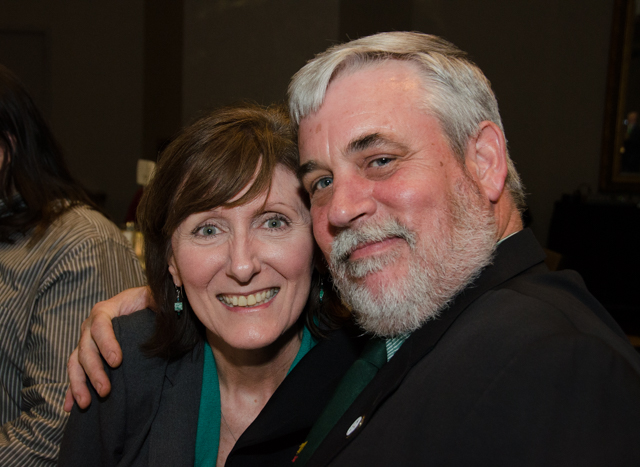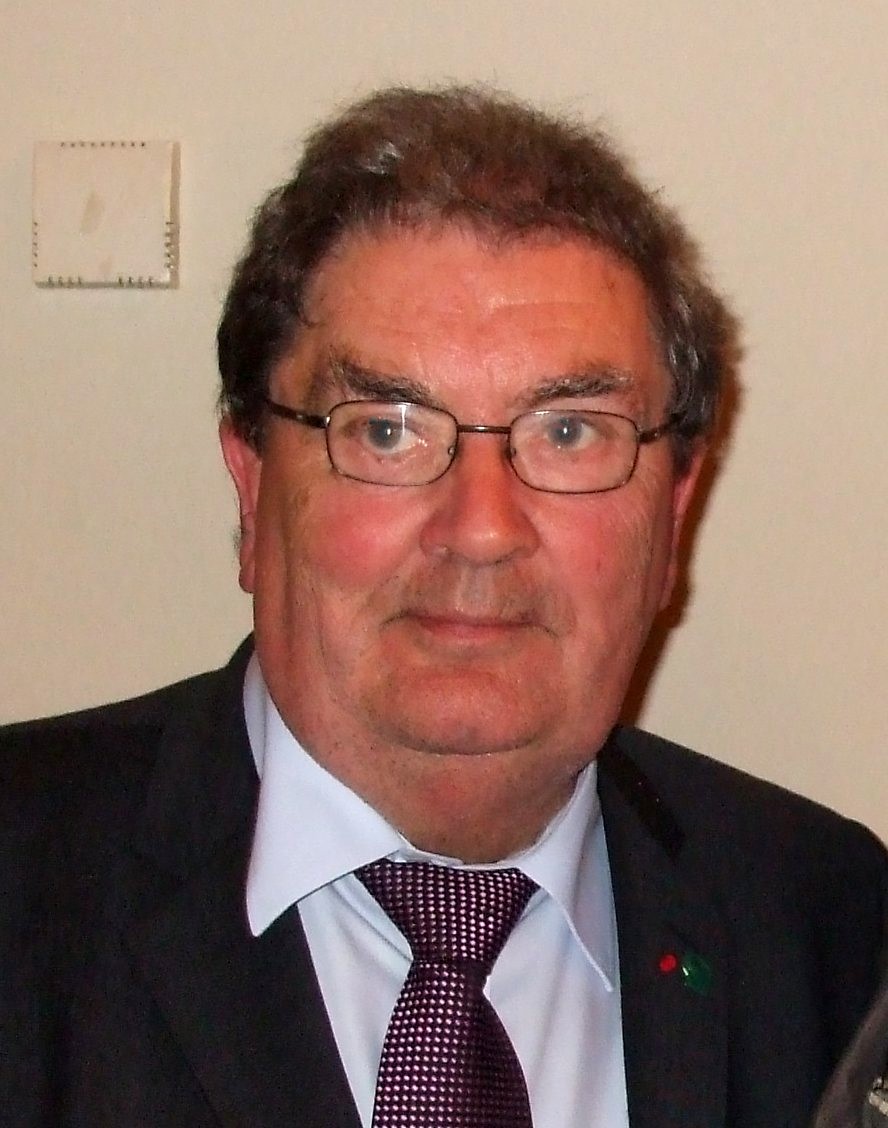Pearse Kerr has all the qualities of a great storyteller: pace and timing; a skill for voices and dialects; a ready laugh that shakes a room.
But most of all, he has stories.
They’re the stories of a young boy who witnessed his first violent death when he was 12 and living in Belfast. He and his family were leaving his grandmother’s house when they saw a British Army foot patrol approaching up the road. In Belfast in the 1970s, it wasn’t an unusual sight. “We were watching them,” he says, “when someone jumped out at them with a handgun and shot one in the back of the head.”
This was life during “The Troubles.”
Born in the United States to Belfast natives Brendan and Betty Kerr, Pearse says he had always been told he was Irish, but that identity was scrambled for him when his parents took their two sons back home to the Falls Road, ground zero for sectarian violence. It was 1970. Pearse was 11 and his brother, Brendan, 5.
His Philly-tinged Yank accent “made everyone in my Christian Brothers school want to fight the Yank,” he said, laughing. But even before it wore off, to the British soldiers, police, and the Protestant kids he sometimes met on the bus on the way to school, he was Irish enough. He was Catholic and the enemy.
The Kerrs left their life in America ostensibly to help the elder Brendan Kerr’s mother after the death of her husband, Pearse’s grandfather. “But I think his reasons for coming back were as much political as personal,” Pearse says.
Brendan Kerr, a bricklayer turned successful bar owner, had helped to found Irish Northern Aid and the Northern Ireland Civil Rights Association in Philadelphia. An active member of Clan na Gael, he was a republican through and through. His eldest son’s name was evidence of that—a tribute to Padraig Pearse, one of the leaders of the Easter Rising in 1916.
“He didn’t want to be the guy who came back when everything was over,” says Pearse. He wanted to have a role.
And so does Pearse Kerr.
It’s the main reason the Jenkintown resident, an electrician for Amtrak and former president of the International Brotherhood of Electrical Works railroad division, joined the Ancient Order of Hibernians back in his mid-30s. He is past president to AOH Div. 25 and currently Philadelphia AOH County Board vice president. “Every AOH has someone whose number one concern is the six-county issue, reunification,” he says. “This is where my heart lies.”
It became his cause the moment he realized he was living in what he calls “a hot neighborhood.
“We were harassed every single day,” he recalls. “On my first day of high school, a soldier hit me with the butt of his rifle and knocked me over a railing.”
Orangemen forced his family out of their first home, threatening to burn it down. The path to school was often littered with broken glass and burning buses. Eventually, Pearse and his classmates started to retaliate. “At lunch time at school,” he says, “we would go down to the barracks, break up paving stones, and throw them, then go back to school.”
He’d dodged so many explosions that later, when he was back in Philadelphia, an M80 went off while he was waiting for a bus in Olney. Everyone at the bus stop was startled, but Pearse hit the sidewalk and crawled to a doorway to hide. “Everyone was staring at me and I said to myself, ‘Yer nuts, man.’ But that was what you had to do,” he says.
On the streets of Belfast, Pearse had been routinely rousted by the British occupation force so he was almost not surprised when, in the middle of the night on August 18, 1977, British soldiers smashed down the door of the family home and pulled him out of his bed, clad only in his underwear. “My mother was throwing my clothes down the stairs as they were dragging me away,” he says. “My father said to them ‘You’d better be careful. He’s an American citizen’ and one of them said, “we don’t give an [expletive deleted] what he is.’”
The soldiers brought the 17-year-old to Castlerea interrogation center in East Belfast, where he was held and tortured for seven days. “They broke my wrist, dislocated my neck, and fractured a rib,” Pearse says. “They choked me until my air supply was cut off.”
Pearse didn’t confess to anything, but he was sent to Crumlin Prison, told he was facing as many as 64 charges, including being a member of the Irish Republican Army and owning a weapon or imitation weapon. “They had nothing,” he says, “but they held me anyway for three months.”
His only trip outside the prison walls was to go to the hospital and even then his jailers used it as an opportunity to degrade and torture him. “The hospital was right near Stormont [the Northern Ireland parliament] and they pulled me out of the car and pushed me down on my chest on the front lawn of Stormont. One of them put his boot on my back and said, “See that? That’s our house. You’re not getting in our house.’”
His father’s words to the soldiers who dragged him out of his house—“He’s an American citizen”—eventually came back to haunt his jailers. In Philadelphia, the Irish community learned of Pearse Kerr’s plight through columns written by famed Daily News reporter Jack McKinney, who had spent several months in Northern Ireland, sending back stories on the conflict there. In the end, Pearse says, he was saved by the efforts of McKinney, the Philadelphia Irish community, “and a Jewish congressman, Joshua Eilberg, who was very into the Irish cause,” says Pearse.
But sitting in Crumlin Prison, Pearse Kerr didn’t know anything about the efforts to release him. Then, one day, he was told to pack up his belongings. “I thought I was going to court to be charged and then sent to Maze prison [Long Kesh prison camp, site of the 1981 Hunger Strike],” he recalls. Instead, he was taken to a city court and released to his family.
His first visit was to his grandmother. “When she saw me she said, “Ah, Jesus, son,’ and then she grabbed me by the arm and said, ‘Get away from the window.’ She thought I had escaped!” He laughs.
It wasn’t a protracted reunion. His family felt he would no longer be safe in Northern Ireland so before long he found himself on an airplane heading for Philadelphia, where he would live with his aunt and uncle.
He was met in Philadelphia by a cheering throng of people and then-Mayor Frank Rizzo, whom Kerr credits with giving him his first lesson in public speaking. “He told me, ‘When you’re up there talking, pretend you’re talking to your little brother. The when you look out there, an awful lot of good-looking women will be smiling at you.’”
He laughs again.
It wasn’t long before he lost his heart to a pretty woman who smiled at him at an Irish beef-and-beer in Philadelphia, a high schooler named Liz. “I looked across the room and looked at her and that was it,” he says, a smile playing across his face. The two are parents of three children—Dana, 36; Brendan, 33, and Patrick, who died at the age of 15 in a skateboarding accident. They also have three grandsons, Brendan, Patrick, and Pearse.
The couple was instrumental in helping form a junior AOH in their son’s name, creating the Patrick Kerr Skateboard Scholarship Fund for U.S. high school seniors who are skateboarders, and establishing several skate parks in the city and suburbs where skateboarders can practice their skills in safety. “These were the good things that came out of Patrick’s death,” he says.
Kerr is also a supporter of Duffy’s Cut, a project to unearth and rehome the remains of 57 Irish immigrants who perished from violence and cholera at a Pennsylvania railroad construction site in 1832 and were buried in a mass grave. From the first time he visited the dig site in Malvern, he was drawn to it.
Unlike many, he didn’t stop at donating money. When the work continues, he says, he’ll be there, digging. “I kept thinking, I should be here. I’m an Irishman who works for the railroad too. I’m supposed to be here,” he says.


